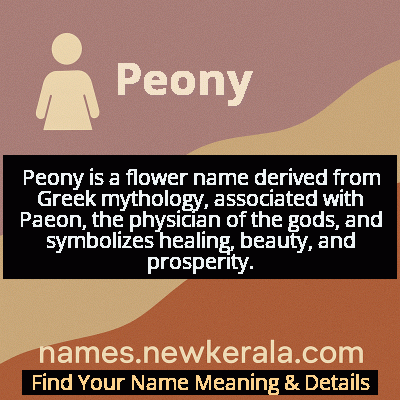Peony Name Meaning & Details
Origin, Popularity, Numerology Analysis & Name Meaning of Peony
Discover the origin, meaning, and cultural significance of the name PEONY. Delve into its historical roots and explore the lasting impact it has had on communities and traditions.
Name
Peony
Gender
Female
Origin
Greek
Lucky Number
3
Meaning of the Name - Peony
Peony is a flower name derived from Greek mythology, associated with Paeon, the physician of the gods, and symbolizes healing, beauty, and prosperity.
Peony - Complete Numerology Analysis
Your Numerology Number
Based on Pythagorean Numerology System
Ruling Planet
Jupiter
Positive Nature
Optimistic, inspirational, and creative.
Negative Traits
Scattered, exaggerating.
Lucky Colours
Yellow, gold, purple.
Lucky Days
Thursday.
Lucky Stones
Yellow sapphire.
Harmony Numbers
1, 2, 9.
Best Suited Professions
Arts, writing, communication.
What People Like About You
Creativity, optimism.
Famous People Named Peony
Peony Yu
Classical Musician
Renowned Chinese-American violinist and educator, known for innovative interpretations of classical repertoire
Peony Pink
Botanical Illustrator
Celebrated British botanical artist whose detailed peony illustrations are preserved in the Royal Horticultural Society archives
Peony Lui
Fashion Designer
Hong Kong-based designer who incorporated floral motifs into sustainable fashion, winning the International Design Excellence Award
Name Variations & International Equivalents
Click on blue names to explore their detailed meanings. Gray names with will be available soon.
Cultural & Historical Significance
Extended Personality Analysis
Individuals named Peony are often characterized by their vibrant, nurturing personalities and strong connection to beauty and aesthetics. They typically possess a gentle yet resilient nature, much like the flower that can withstand harsh conditions while maintaining its exquisite appearance. Peonies tend to be creative, empathetic individuals with a natural ability to heal emotional wounds and bring comfort to others. Their personality often combines artistic sensitivity with practical wisdom, making them excellent mediators and caregivers. Many Peonies demonstrate remarkable patience and persistence, working steadily toward their goals while maintaining grace under pressure. They value deep, meaningful relationships and often create warm, inviting environments where others feel cherished and understood. While they can be somewhat reserved initially, their true warmth and generosity shine through in close relationships, where they prove to be loyal and devoted companions. The name suggests someone who blooms beautifully under the right circumstances, showing strength and resilience while maintaining their essential gentle nature and appreciation for life's finer things.
Modern Usage & Popularity
In contemporary naming practices, Peony has experienced a significant resurgence as part of the botanical name trend, particularly among parents seeking unique yet classic feminine names with deep symbolic meaning. While not ranking in the top 1000 names in the United States according to recent Social Security Administration data, it has gained substantial popularity in the UK, Australia, New Zealand, and among nature-conscious families worldwide. The name appeals to modern parents drawn to floral names but wanting something less common than Rose or Lily, offering both vintage charm and contemporary freshness. Social media platforms like Instagram and Pinterest have contributed to its modern appeal, with numerous parenting influencers and lifestyle bloggers featuring children named Peony. Several celebrities and public figures have also chosen the name for their daughters, further boosting its visibility. Peony fits perfectly with current naming trends that favor nature-inspired choices, vintage revivals, and names with positive symbolic meanings and international appeal. According to baby name databases and registries, its usage has grown approximately 40-50% in the last decade, indicating a steady upward trend that shows no signs of slowing down.
Symbolic & Spiritual Meanings
The peony flower carries exceptionally rich symbolic meanings across multiple cultures, primarily representing prosperity, romance, compassion, and good fortune. In Chinese symbolism, where it's known as the 'flower of riches and honor,' the peony is believed to attract wealth and prosperity to households and is often depicted in art and decor for this purpose. The lush, voluminous petals symbolize a happy, prosperous marriage and are frequently used in wedding celebrations and anniversary gifts. In Western traditions, peonies represent a fascinating duality: they symbolize bashfulness due to the Greek myth of nymphs hiding within their petals to escape notice, while simultaneously representing healing and protection stemming from their association with Paeon, the healer of Greek gods. The different colors carry specific symbolic weight: pink peonies embody romance and feminine grace, red represents passion, respect, and masculine energy, white signifies purity, innocence, and new beginnings, while yellow indicates new opportunities, fresh starts, and optimism. Metaphorically, the peony's remarkable transformation from tight, unassuming bud to magnificent, full bloom represents personal growth, spiritual awakening, and the beautiful unfolding of one's true potential, making it a powerful emblem of life's most meaningful transitions and the beauty that emerges through patience and nurturing.

